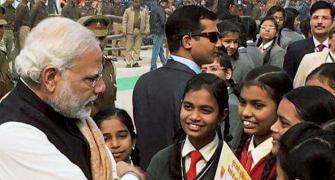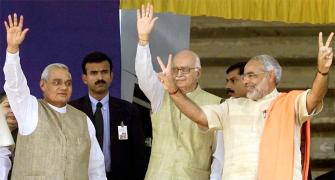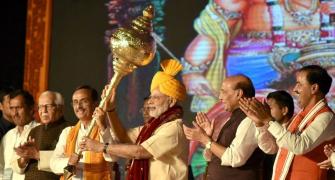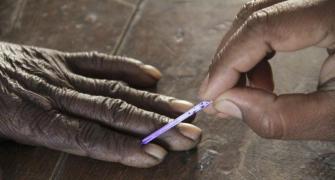'The monumental first Modi wrought in 2014, followed by the miracle in Uttar Pradesh, is not a matter for celebration, but an ominous warning of the perils ahead.'
'There are 5 areas which Modi has to address immediately and relentlessly if he has to live up to all that the people are taking him for,' says B S Raghavan, the distinguished civil servant.
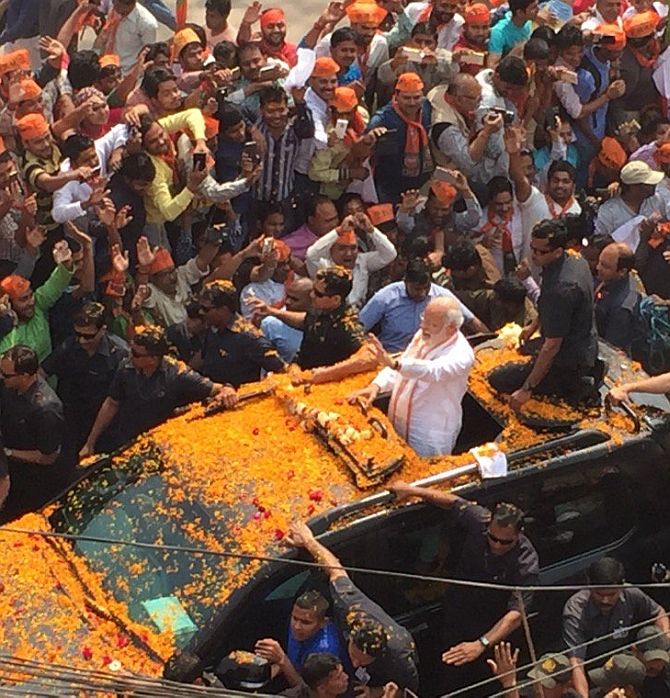
A disclaimer and a disclosure on my part becomes necessary in today's intolerant milieu when even highly educated people cannot get out of the habit of thinking in terms of black and white, and affixing instant labels of pro- and anti- , stooge and sycophant, merely for expressing one's honest views.
I am no ideologue of any sort, no partisan of any political belief.
At 90, I am beyond any coveting of any perks or favours.
Like Subrahmanya Bharati, I only seek to put out views that I think are for the good of the country, based on my close involvement with decision-making at the macro- and micro- levels from the era of Mahatma Gandhi and Jawaharlal Nehru.
As secretary of the National Integration Council from the time of its founder-president, Jawaharlal Nehu, I have seen the evolution of political currents and cross currents in the country, and dealt with many of the cataclysmic political episodes.
My comments should be read as coming from a dispassionate and detached observer.
My quarrel with print and electronic media commentators and political analysts passing for psephologists is that they get lost in numbers, percentages and sociological jetsam and flotsam, ploughing through religious, caste and community computations, with little relevance to the big picture of an event of epochal significance.
The march of the Bharatiya Janata Party juggernaut in Uttar Pradesh and Uttarakhand to the decimation of all who stood in its way beggars description.
The big picture emerging and likely to leave its stamp, maybe, for as long as Narendra Modi is there to lead the BJP, is that the people of the country, in state after state, are increasingly getting sick and tired of shibboleths of the Congress-cum-UPA era.
Modi, in their eyes, seems a personification of their dreams and aspirations, and one who will not be shy of taking the toughest decisions, if they are warranted, regardless of opposition from small minds.
It is not so much the prospects for economic growth, jobs, poverty removal, better standards of living, that conditions their expectation, though all of that might also getting factored into their psyche.
Somehow or the other, he has become the symbol of hope to help free themselves from all the growing sense of humiliations, harassments, oppressions and dejection and rejection they have been feeling for decades past.
The only other example I can think of is Mahatma Gandhi, though chronic Modi-baiters and BJP-haters will shudder at the comparison.
Gandhi's hypnotic hold on the people also derived from his being the symbol and standard-bearer of their hopes, and from their regarding him as one of themselves.
They -- Hindus, Muslims, Christians, Sikhs and people of all sects and denominations -- knew about his devotion to Ram, but they also knew that Ram, in his reckoning, was an all-encompassing spiritual principle.
When he one fine morning announced that he would march 220 miles to Dandi to pick up salt to protest the minuscule quarter-of-an-anna tax per maund (37 kilograms) imposed by the British, the rest of the elitist liberal intellectuals (ELIs), and even Nehru, who was closest to him, were shocked.
Nehru thought the man had gone berserk. What has salt got to do with independence from British imperialism, with Constituent Assembly elections, vote and the like being the major stakes? But it was the Salt Satyagraha that resulted in the largest mobilisation and incarceration seen in India's freedom struggle, throwing the British rule in Delhi and London completely off balance.
Similarly, today's ELIs are struggling to make head or tail of what Narendra Modi means to people. And hence their knee-jerk reflexes.
It is not so much the BJP as a party, or the debate of secularism versus communalism, with which the people are concerned.
They, in their heart of hearts, are convinced that Narendra Modi feels for them, feels for their not having toilets, a roof on their heads, clean drinking water, a better future for their kids.
That is all that they can figure out about governance in its basic sense -- something that touches every minute of their quotidian existence.
And so, they are coming out, and will in future come out, in large numbers to heed his call.
That explains all the ELIs falling flat on their faces claiming, or hoping, that demonetisation would be Modi's undoing.
The trust that the people thus have so unreservedly placed in him -- almost as if he is their last hope -- represents a mortal danger as well.
For, if that trust is falsified, there will be a tsunami of a backlash, a total loss of faith in the established order and a merciless pulling down of all props of the shell and the sham that India's democracy is seen to be.
So, the monumental first Modi wrought in 2014, followed by the miracle in Uttar Pradesh, is not a matter for celebration, but an ominous warning of the perils ahead.
There are at least five areas which Modi has to address immediately and relentlessly if he has to live up to all that the people in the mass are taking him for.
First, the 'deep State' -- the bureaucracy, has not yet been tamed.
It is still functioning from the top right down to the block level in the old imperialist, colonial ways, with no sensitivity, empathy, responsiveness, values, involvement and commitment.
The same heartlessness, the same lethargy, the same apathy towards the concerns of the people.
Already he has taken too long a time in carrying out merciless weeding out of the incompetent and ensuring service delivery for the asking.
Any more tardiness and he will be swallowed up by the system and will sink without a trace, like all his predecessors, including Jawaharlal Nehru and Indira Gandhi, did.
Second, he must inculcate in the elected representatives, first of his party, and then by setting an example, of other parties, adherence to canons of transparent honesty, a passion for service and unremitting attention to redressing grievances and fulfilling legitimate demands.
There is no point in his serenading solo the importance of performance, minimum government and maximum governance and the like, if he cannot align the thinking of his party functionaries and alliance partners on these lines.
He, no doubt, with his sixth sense, realises the intense revulsion that the people feel for all political parties as a whole, reflective of Kamaraj's famous remark that they are all waste products soaked in the same dirty water.
He must clean up the political system pretty fast.
Third, he should come down heavily and visibly on any transgressions of ethics and morality in public life.
The Santhanam Committee on Prevention of Corruption (1966), of which I was the secretary, had strongly recommended that those in politics who had been accused of malfeasance, and convicted and sentences for various kinds of misdemeanours should be ostracised and never be admitted to party positions and public office.
Modi should avoid being seen hobnobbing with persons of dubious reputation and character.
Fourth, he should emulate Jawaharlal Nehru in attending Parliament for as long and as often as possible, readily agreeing to debates on matters agitating members or the public mind, and quickly sharing as much information as possible.
It was said of the first Queen Elizabeth that her mastery of parliament and universal popularity was because (in Macaulay's words) what she gave, she gave willingly and at once, on the principle that what was at once given was twice given, and what she withheld, she withheld firmly and by adducing reasons.
A good principle for all in governments in all climes and times.
Fifth, he should be visible in all far corners all over India, once again taking Nehru and Gandhi as his models.
Simply because he is more comfortable in the Hindi belt, he may be tempted to spend more time there. The proportion of his visits to the South should at least be equal to that of his visits to the northern states.
Who knows, he may even be able thereby to win the South for the BJP, by establishing rapport with its people.
Good luck, Modi!
B S Raghavan was a member of the Indian Administrative Service who was director of political and security policy planning in the Union ministry of home affairs, the secretary of the National Integration Council during the time of the first three prime ministers after Independence, the chief secretary of a state, US Congressional fellow and policy adviser to the UN (FAO), besides being the chancellor of Jharkhand ICFAI university.

